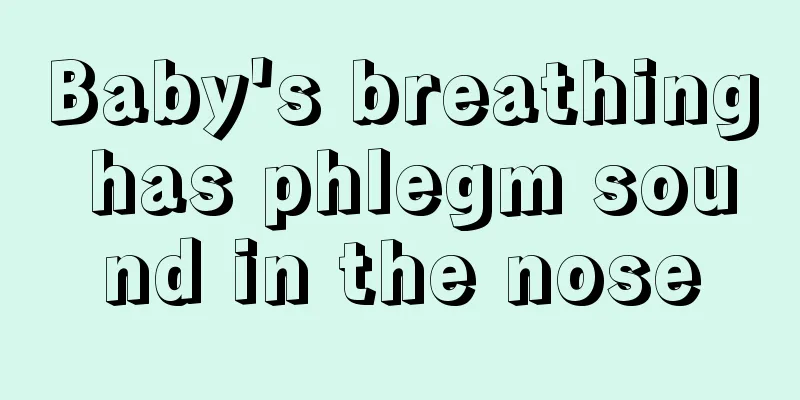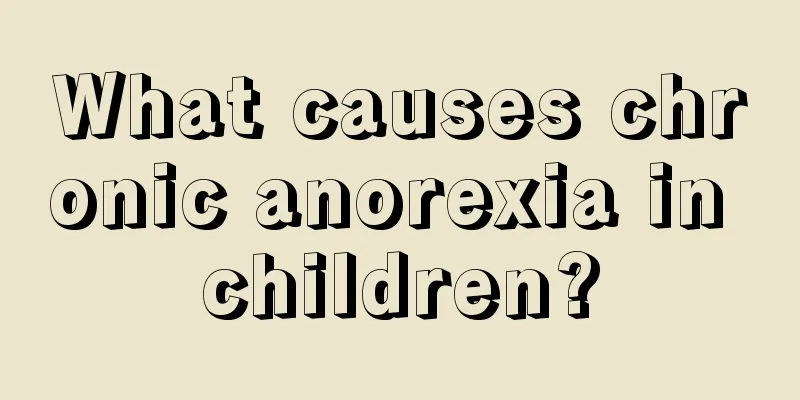Baby's breathing has phlegm sound in the nose

|
If the baby has phlegm in the nose when breathing, it means that the baby's physical constitution is relatively weak, which may be related to respiratory tract infection. You should go to the hospital for examination in time. Don't take it lightly at this time, because the baby has a high chance of pneumonia. At this time, you must clarify the cause, and then actively treat it under the guidance of a doctor. Pay attention to timely hydration in daily life. Baby's breathing has phlegm sound in the nose Step 1: Determine whether it is a respiratory infection There are many reasons that cause phlegm and gurgling sounds in the throat of newborns, including normal reasons and disease reasons. Among them, if bronchitis is caused by respiratory tract infection, it needs to be taken seriously, because if not treated in time, it may cause neonatal pneumonia. Neonatal respiratory tract infection usually has symptoms of dry cough in the early stages, followed by increased bronchial secretions, but newborns do not produce phlegm, so they make snoring sounds when breathing. It is often accompanied by symptoms such as fever and loss of appetite. If the newborn has gurgling throat due to respiratory tract infection, bronchitis, pneumonia and other diseases, active treatment should be given under the guidance of a doctor. Step 2: Adjust the newborn's lying position Because the respiratory function of the newborn is not fully developed, and it is not able to cough up the phlegm in the throat independently, when the newborn has phlegm in the throat, parents should often help the newborn adjust the lying position, so that the respiratory secretions can be easily discharged, and try to use the side-lying position. Step 3: Make the baby cry The physiological functions of newborns are not fully developed, and they cannot swallow saliva, which easily causes saliva to flow into the throat and accumulate. Therefore, when the respiratory air flows in and out of the trachea, the air and water mix, producing snoring breathing noises. Parents can let their children cry or tease the baby to cry, because when the baby cries hard, it will promote the discharge of phlegm in the trachea. Step 4: Give your baby water For some artificially fed newborns, if the concentration of milk powder is not well controlled during the mixing process, the milk powder will be too thick and easily remain in the mouth or throat, which can cause a condition similar to phlegm in the throat. In this case, you can feed the newborn some clean water in an appropriate amount. Drinking water in an appropriate amount can help dilute the thick phlegm in the baby's throat, which is beneficial for the newborn to expel the phlegm in the throat. Step 5: Help the newborn to cough up phlegm The larynx and palate cartilages of newborns are not yet fully developed, and they cannot cough up phlegm on their own. Therefore, parents need to help the newborns cough up phlegm, usually by patting the back. This can not only loosen the phlegm in the child's lungs and bronchi, drain it into the trachea and discharge it, but also promote blood circulation in the heart and lungs, which is beneficial to the absorption of bronchial inflammation and allows the disease to heal as soon as possible. The specific method is as follows: 1. Pick up the baby, let the baby's head rest on the parent's shoulders, and then pat the baby's back with your empty fists. 2. The force of the patting should not be too strong. It should be done from top to bottom, in sequence, for 3-5 minutes each time, and 2-3 times a day. Step 6: Improve your living environment Some newborns' living environment contains dust, pollen, milk powder, clothing fibers, animal hair, etc. When inhaled by the newborns, the secretions in the respiratory tract will increase to block these foreign objects, causing phlegm to get stuck in the throat, and the newborns' breathing will be accompanied by a gurgling sound. In this case, you should pay attention to improving the living environment of the newborn to avoid dust. If conditions permit, you can place an air purifier so that the newborn will gradually no longer have phlegm in the throat. Step 7: Vitamin D supplement Congenital laryngeal cartilage dysplasia in newborns can also cause gurgling sounds in the throat, which sounds like there is phlegm in the throat. In fact, it is because the baby's laryngeal cartilage is not fully developed. When inhaling, the laryngeal tissue collapses and the laryngeal cavity becomes smaller. The airflow passes through the obstructed airway and produces turbulence, forming pathological respiratory sounds, and there is no phlegm. In this case, vitamin D supplementation should be started when the newborn is two weeks old, and the baby can be taken out to bask in the sun when the weather is good to promote calcium absorption and synthesis, which is beneficial to the development of laryngeal cartilage. |
<<: Baby's breathing has phlegm sound in the nose
>>: Seven-month-old baby has phlegm sound when breathing
Recommend
How to treat carbon monoxide poisoning in children
Carbon monoxide poisoning is a very common phenom...
What should children eat when their stomach is upset?
If the child has a bad stomach, we recommend that...
Is there any relationship between broken palm lines and Down syndrome?
Most children with Down syndrome have a broken pa...
What to do if your baby vomits during breastfeeding
Sometimes, during the breastfeeding period, impro...
Why does my child always grind his teeth?
Teeth grinding is a normal physiological habit in...
Can a three-month-old baby use a fan?
The hot summer is very unbearable, because it can...
What is the best way to treat baby allergies?
Baby skin allergy is a common phenomenon, but it ...
Teenagers leg pain knee pain
The bodies of teenagers are in the fastest period...
What is the physiological milk aversion period?
I believe many parents have encountered this situ...
What should children eat to grow taller?
We all know that parents hope that their children...
What soup should babies drink when they have a cough?
Coughing causes excessive sputum and finally feve...
37-month-old baby development indicators
Generally speaking, the development standards of ...
What are the dietary treatments for infant diarrhea? What should babies eat if they have diarrhea?
Diarrhea is a very common symptom among infants. ...
What to do if your baby's hands and feet are cold and sweaty
We know that since the organs of babies are not f...
Why do babies have pigeon-toed feet and how to correct them
Generally speaking, babies around one or two year...









